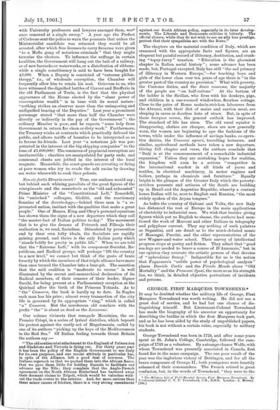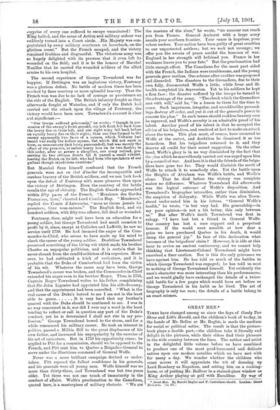GEORGE, FIRST MARQUESS TOWNSHEND.* IT may be doubted whether the
military life of George, First Marquess Townshend was worth writing. He did not see a great deal of service, and he had but one chance of dis- tinguishing himself. But Lieutenant-Colonel Townshend has made the biography of his ancestor an opportunity for describing the battles in which the first Marquess took part, and as he has been aided by the study of unpublished papers, his book is not without a certain value, especially to military students.
George Townshend was born in 1724, and after some years spent at St. John's College, Cambridge, followed the cam- paign of 1743 as a volunteer. By a strange chance Wolfe, with whom Townshend was presently associated in Canada, first faced fire in the same campaign. The one poor result of the year was the inglorious victory of Dettingen, and for all the brave composure of George H., both youngsters were heartily ashamed of their commanders. The French retired in great confusion, but, in the words of Townshend, "they were to the
• The Mflitary Life of Fietcl-Marshat George, First Marquises Townshend. By T.i.utenant-Colonel C. V. F. Townshend, C.B., D.S.O. London : 3. Murray.
suqrise of every one suffered to escape unmolested ! The Kg halted, and the scene of Action and military ardour was suddenly turned into a Court circle. ,Hie Majesty was con- gratulated by every military courtezan on horseback, on the glorious event." But the French escaped, and the victory remained fruitless and disgraceful. The victorious army was so hugely delighted with its, prowess that it even left its wounded on the field ; and it is to the honour of Marshal Noailles that he carried the wounded soldiers of the allied armies to his own hospital.
The second experience of George Townshend was far happier. If Dettingen was an inglorious victory, Fontenoy was .a glorious defeat. No battle of modern times has been marked by finer courtesy or more splendid bravery. That the French won was due to no lack of courage or persistence on the side of the English. The British infantry fought as they afterwards fought at Waterloo, and if only the Dutch had carried out the attack upon the village of Fontenoy, the victory would have been ours. Townsherd's account is clear and significant :—
"Our troops suffered grievously," he wrote "though in pos- session of the enemy's front ground, our left flank fell back from the heavy fire on their left, and our right wing fell back before an equally heavy fire on their right; thus our line formed to the enemy apparently two faces of a square, which Voltaire bad learnt was really the hollow square, but which did not exist in form, as unnecessary (not being surrounded), but was merely the effect of the pressure, or rather heavy loss on its two flanks; in this order, after so severe a slaughter, our army retired, pre- serving its two oblique fronts till it passed a small rivulet, leering the Dutch on its left, who had been idle spectators of our gallant though injudicious exertions."
But Marshal Saxe himself confessed that the French generals were not en. i1at d'imiter the incomparable and careless bravery of the British soldiers, and we can look back upon the defeat of Fontenoy with more pleasure than upon the victory of Dettingen. Even the courtesy of the battle
recalls the age of aivalry. The English Guards approached within fifty paces of the French. "Messieurs des Gardes Francalses, tires," shouted Lord Charles Hay. " Messieurs," replied the Comte d'Anteroche, nous ne tirons jamais lea premiers; tirez vous-memes." The English fixed, and six hundred soldiers, with fifty-two officers, fell dead or wounded.
Fontenoy, then, might well have been an education for a young soldier, but George Townshend had small occasion to profit by it, since, except at Culloden and Laffeldt, he saw no service until 1759. He had incurred the anger of the Com- mander-in-Chief, who seems to have made up his mind to check the career of the young soldier. Doubtless Townshend possessed something of the biting wit which made his brother
Charles an unpopular politician, and it is certain that he never shrank from the candid criticism of his superiors. More- over, he had cultivated a trick of caricature, and it is probable that the Duke of Cumberland had been the victim
of his wit. Whatever the cause may have been, George Townshend's career was broken, and the Commander-in-Chief extended his anger even to his brother Roger. Thus, in 1755, Captain Roger Townshend writes to his father complaining that Sir John Ligonier had appointed him his aide-de-camp, and that the appointinent had)been cancelled. "What is the real cause of the Duke's hatred to me I am not in the least able to guess It is very hard that my brother's quarrel with the Duke should be continued to me.- I was in no way concerned in it, nor did I ever say a word hi the least tending to reflect or call in question any part of the Duke's conduct, yet he is determined I shall not rise in my pro-
fession." George Townshend bowed to the storm, and for a while renounced his military. career. He took an interest in politics, passed a Militia Bill to the great displeasure of his
own father, and increased his unpopularity by the exercise of his art of caricature. But in 1759 his opportunity came; he applied to Pitt for a commission, should we be opposed to the French, and Pitt sent him to Quebec a Brigadier-General to serve under the illustrious command of General Wolfe.
Never was a more brilliant campaign devised or under- taken. Pitt reposed the fullest confidence in his generals, and his generals were all young men. Wolfe himself was no more than thirty-three, and Townshend was but two years older. Yet there was not one touch of immaturity in the conduct of affairs. Wolfe's proclamation to the Canadians1 quoted here, is a masterpiece of military rhetoric. "We are
the masters of the river," he wrote, "no succour can reach you from France. General Amherst with a large army assails your southern frontier. Your Pause is hopeless, your valour useless. Your nation have been guilty of great cruelties to our unprotected settlers ; but we seek not revenge; we offer You the sweets of peace amidst the honours of war. England in her strength will befriend you. France in her weakness leaves you to your fate." But the proclamation had little enough effect. The Canadians for the most part sided with the French. the Indians were troublesome, and the young generals grew restless. One scheme after another was proposed and discarded. The disasters to the Grenadiers, due to their own folly, disconcerted Wolfe a little, while fever and ill. health completed his depression. Yet to his soldiers he kept a firm face the disaster suffered by the troops he turned tc the advantage of the army. "The check which the Grenadiers met with will," said he, "be a lesson to them for the time tc come. Such impetuous, irregular, and unsoldierlike proceed- ings destroy all order, and put it out of the general's power to execute his plan." In such terms should reckless bravery ever be reproved, and Wolfe's severity is an admirable proof of his talent. Another proof of his talent is that he accepted the advice of his brigadiers, and resolved at last to make an attack above the town. This plan must, of course, have occurred to Wolfe at the outset, and doubtless he dismissed it as too hazardous. But his brigadiers returned to it, and they deserve all credit for their sound suggestion. On the other hand, Wolfe's glory is in no way diminished by the fact that the plan which he marvellously carried out was urged upon him by a council of war. And here it is that the friends of the briga- diers have gone too far. They would diminish the merit of Wolfe to attach it to somebody else. Yet the battle upon the Heights of Abraham was Wolfe's battle, and Wolfe's alone. That he . died . before the victory was complete makes no difference. Whatever Townshend did afterwards was the logical outcome of Wolfe's disposition. And Townshend's biographer intensifies, rather than diminishes, the suspicion of disloyalty. While Wolfe was alive Town- shend under-rated him in his letters. "General Wolfe's health," he wrote, "is but very bad. His generalship—in my poor opinion—is not a bit better, this only between us." But after Wolfe's death Townshend was first in eulogy. "I have lost but a friend in General Wolfe. Our country has lost a sure support and a perpetual honour. If the world were sensible at how dear a price we have purchased Quebec in his death, it would damp, the general joy." In face of this declaration what becomes of the brigadiers' claim ? However, it is idle at this hour to revive an ancient controversy, and we cannot help thinking that Lieutenant-Colonel Townshend might have exercised a finer caution. Nor is this the only grievance we have against him. He has told us much of the battles in which George Townshend was engaged; he has told us next to nothing of George Townshend himself. Yet evidently the man's character was more interesting than his performances ; and we would gladly have exchanged the details of a twice- told battle for a few pages which would have set before us George Townshend in his habit as he lived. The art of biography is only too rare; the details of a battle belong to an exact science.







































 Previous page
Previous page